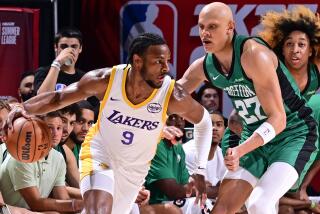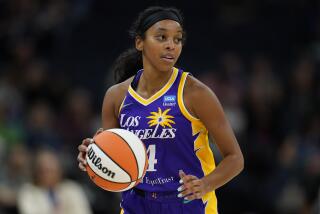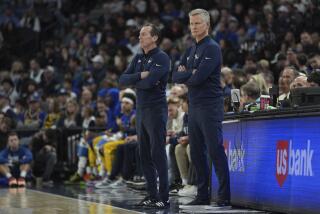Lakers appreciate how Mike Brown handled tough circumstances
Even as he faced a steep mountain, Mike Brown kept climbing. Even as the doubts lingered, Brown kept grinding. Even as the Lakers’ personnel kept changing, Brown simply kept coaching.
That doesn’t necessarily warrant a high grade given the outcome. After the Lakers lost in five games to the Oklahoma City Thunder in the Western Conference semifinals, Brown remained his most vocal critic on how he performed in his first year as the Lakers’ head coach.
“I feel like I could’ve done a lot better,” he said in his final news conference this week.
Brown said he could’ve done better knowing his personnel. He said he could’ve done better on navigating the lockout shortened season by striking the right balance between maximizing practice time and ensuring his veteran-laden roster got enough rest. Brown felt he could’ve done a lot better, saying “there were a lot of things I rushed on,” which could include installing plays, figuring out rotations and adapting to the high-profile attention the Lakers receive.
Yet Brown still guided the Lakers to a third-place finish in the Western Conference and finished with more playoff victories in his first season as the Lakers coach than Phil Jackson did in his last season at the same position. That hardly meets the Lakers’ championship standards, but it’s clear the organization appreciates how Brown tried to maximize the hand he had been dealt.
Said Lakers General Manager Mitch Kupchak: “I thought he did a fine job considering everything that took place this year.” So what took place?
Well, let’s just start from the beginning. The Lakers’ fanbase didn’t give Brown’s hiring a warm response, aware of the perception that he couldn’t coach LeBron James in Cleveland and disappointed that Brian Shaw was passed up as Jackson’s successor. Yet, Brown remained positive and understanding.
The Lakers thought they completed a blockbuster deal in which they shipped away Pau Gasol and Lamar Odom and acquired Chris Paul. But the NBA nixed it for “basketball reasons,” and the Lakers were left with how to handle Gasol and Odom. They kept a hurt Gasol, but they traded a disgruntled Odom. The Lakers then also featured four new players at training camp and then two new players after the trade deadline.
Still, Brown maintained the same work ethic that impressed the Lakers’ front office in his interview. He maintained the same infectious enthusiasm he shared during his introductory press conference.
The Lakers noticed.
“I told Mike I was happy and wanted to thank him for his dedication and work throughout the year,” Gasol said. “He’s a caring coach and I appreciated that. We all try to do our job, basically. When you see someone try to do their job the best way they can, you can’t really complain or give them a hard time for it.”
But that’s the thing. There were plenty of complaints and an ongoing challenge for Brown to convince his players to buy into his system.
Only two weeks into the season, I had been directly and indirectly told a fair amount of players had grown tired of Brown’s prolonged practices and film sessions as well as his constantly shuffling rotations. Metta World Peace soon questioned his coaching credentials by bringing up his background as a video coordinator. Andrew Bynum defiantly shot a three-pointer in one game and appeared not to listen to him on the sideline. Gasol lamented having a reduced role.
Kobe Bryant, who has been publicly supportive of Brown all season, occasionally griped about Brown’s offense making it more difficult for him to find open looks. Plenty of the Lakers’ reserves tired of wondering to what degree their fluctuating minutes reflected more of Brown’s indecisiveness than their own inconsistency. Brown’s calling card on defense showed varying degrees of success throughout the season. Magic Johnson even suggested the Lakers would fire Brown had the Lakers lost Game 7 in their first-round series against Denver.
“I think it was a tough connection between the staff and the players this year,” said forward Matt Barnes said, whose role fluctuated between starting at small forward, coming off the bench and not playing at all. “The lack of time we had to bond and just really an old system meeting a completely new system. I’m sure it’s something every team faced, but it was just different.”
Nonetheless, Brown adjusted in various ways.
He gave his players a sense of ownership by reducing the amount of practice time and film sessions. Brown showed his authority on the team by benching Bryant and Bynum in separate games. His experimenting rotations paid off for wild cards, such as Jordan Hill and Andrew Goudelock. Brown’s connection with the players improved.
“We really grew a lot closer as the season went on,” Bynum said of Brown. “I could talk to him and approach him. He had an open door and vice versa. That was a little bit different than I was used to with Phil.”
Of course it was. Brown was replacing a living legend who won 11 NBA championship rings and joined a team that demands such achievements be immediately duplicated.
“To really give myself a true evaluation would be hard, I felt based on the circumstances,” Brown said. “I had a great staff. They helped out a lot. We did fairly well. But could we have done better? Yes, we could’ve done a lot better.”
Still, the Lakers clearly recognized Brown fulfilled that job description, working tirelessly to overcome the obstacles thrown his way.
RELATED:
Mike Brown laughs off Metta World Peace’s making fun of weight
Lakers GM Mitch Kupchak: ‘There will be some change’
Mike Brown: “I feel like I could’ve done a lot better”
E-mail the Lakers blog at mgmedin@gmail.com. Follow the Lakers blog on Twitter.
More to Read
All things Lakers, all the time.
Get all the Lakers news you need in Dan Woike's weekly newsletter.
You may occasionally receive promotional content from the Los Angeles Times.






